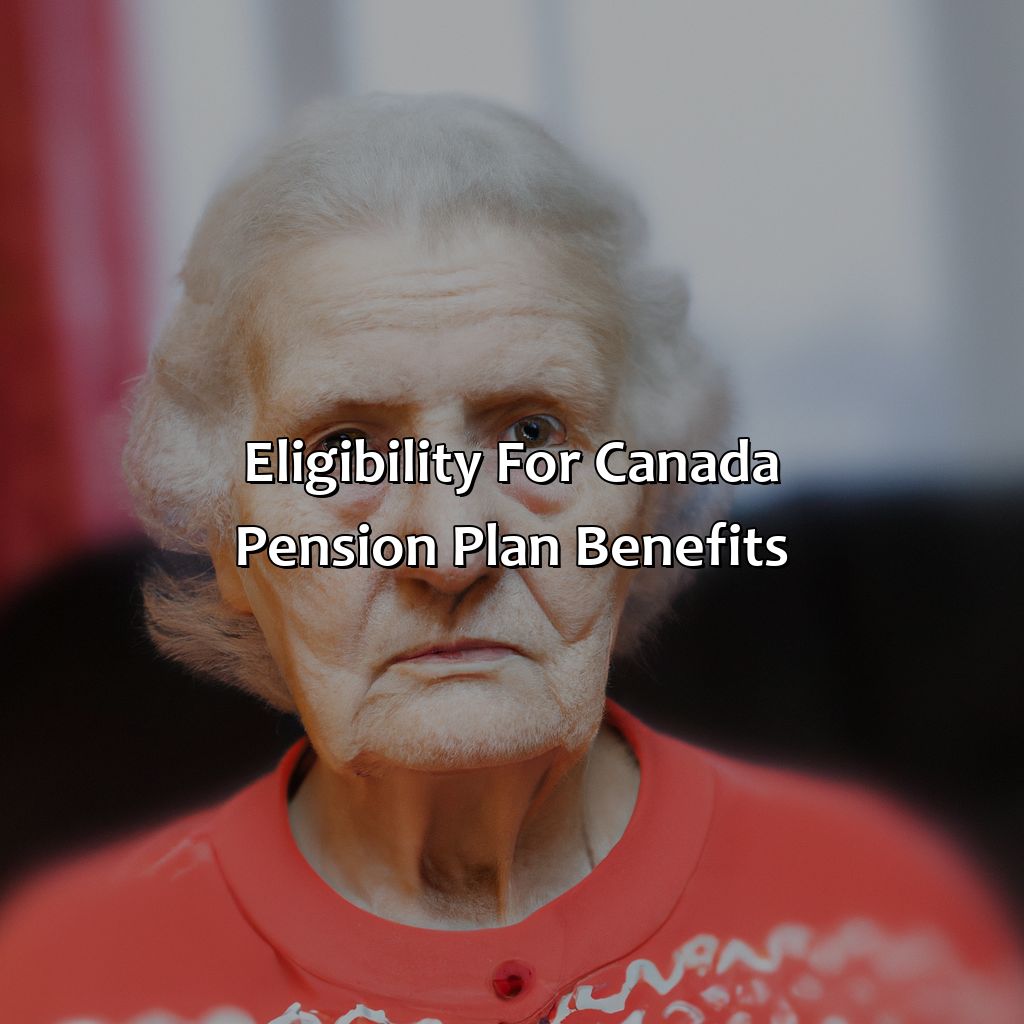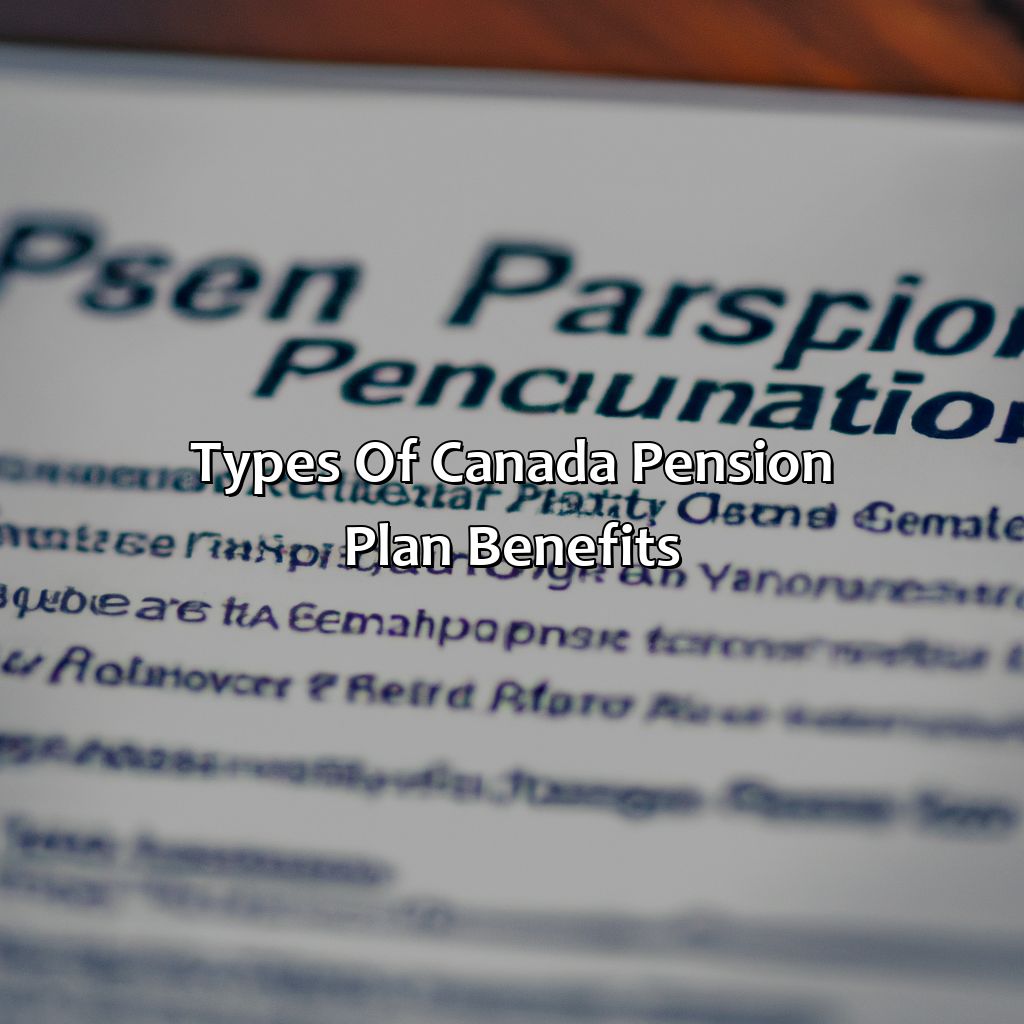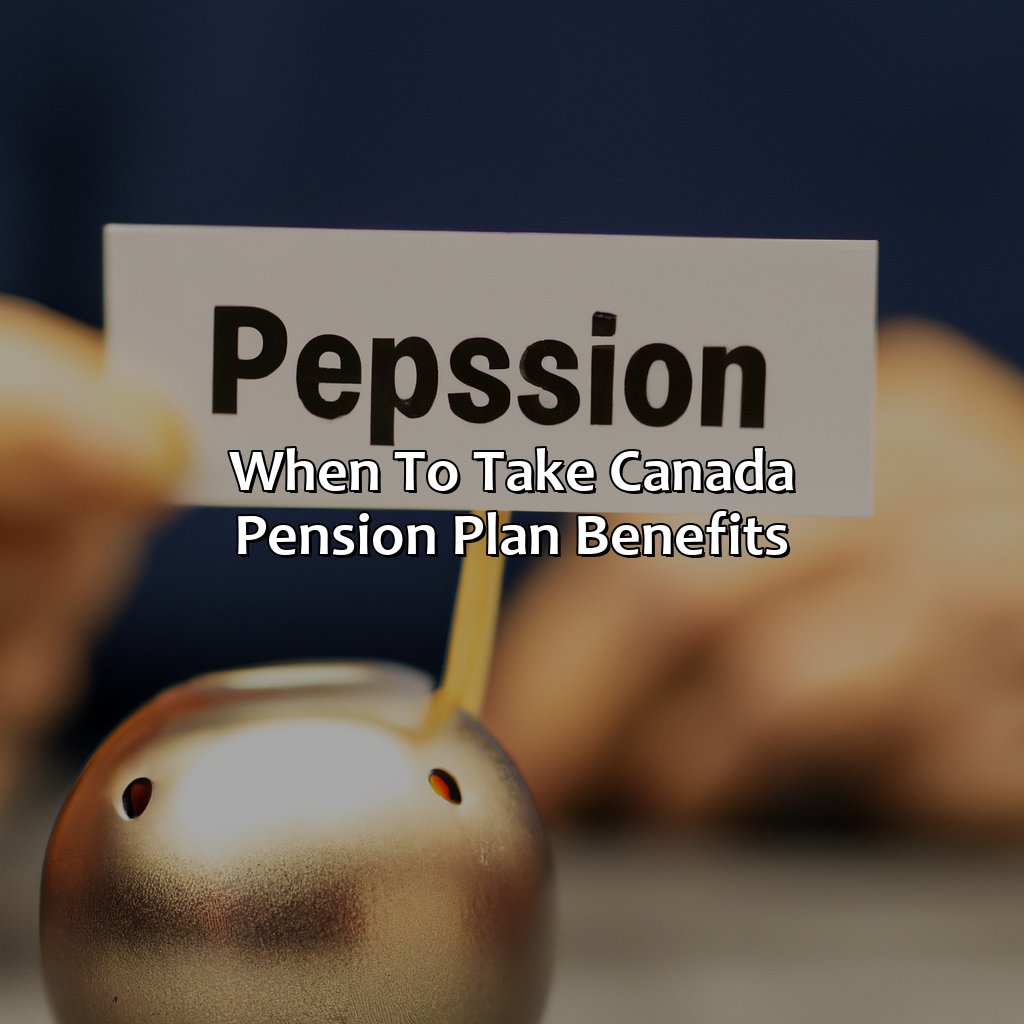When To Take Canada Pension Plan Benefits?
Key takeaways:
- Consider financial needs: When deciding when to take Canada Pension Plan benefits, it’s important to consider your current financial situation. If you need the money to cover living expenses, taking benefits early with a reduction may be necessary.
- Take health status into account: Another important factor is your health status. If you have health issues that may reduce your life expectancy, taking benefits early may be the best option to ensure you receive the maximum amount of benefits.
- Life expectancy matters: Your life expectancy is also a key factor to consider. If you expect to live a long life, delaying benefits until after your normal retirement age or even taking late retirement with a bonus may be a better option to maximize your benefits.
Do you want to make the most out of your retirement savings, but don’t know when to take Canada Pension Plan (CPP) benefits? This article will help you decide when best to tap into this important source of income. You’ll learn how to make sure CPP fits into your overall retirement plan so you can enjoy a comfortable retirement.
Eligibility for Canada Pension Plan benefits
Do you want to qualify for Canadian Pension Plan benefits? You’ll need to meet certain criteria. To make sure you’re eligible, you must know the age and contribution requirements. Check out this info on ‘Eligibility for Canada Pension Plan benefits.’ It covers ‘Age Requirements’ and ‘Contribution Requirements.’ That’ll help you understand the conditions of the plan.

Image credits: retiregenz.com by David Arnold
Age requirements
The age at which one can start receiving Canada Pension Plan (CPP) benefits is an important factor to consider. CPP benefits are available to those who have contributed to the plan for a minimum of 10 years and have reached the age of eligibility. The standard age of eligibility for CPP is 65, but individuals as young as 60 can begin receiving reduced benefits or delay receiving benefits until age 70 to increase their total payout.
Additionally, some may be eligible for disability or survivor benefits before reaching the standard age of eligibility based on certain criteria like medical condition or life events. It’s important to understand these nuances when planning your retirement strategy.
Recently, my friend’s father started receiving CPP disability benefits due to a chronic illness that prevented him from working. This unexpected event highlighted the importance of understanding CPP eligibility requirements and how to apply for Canada Pension benefits to assist during unforeseen circumstances in one’s life.
Contributing to your retirement fund is like planting a tree – the earlier you start, the more shade you’ll have when you’re old and wrinkly.
Contribution requirements
For being eligible to receive Canada Pension Plan (CPP) benefits, one needs to fulfill certain requirements. These requirements can be referred to as ‘Qualifying criteria for CPP benefits’.
The following are the criteria for CPP benefits:
- Age requirement – One must be 60 or older to qualify for CPP benefits. However, in specific situations, the age requirement can be flexible.
- Contribution requirement – The amount of CPP contributions that have been made over the years is recorded. One must have made sufficient contributions to qualify for CPP benefits.
- Disability benefits – If someone becomes disabled and unable to work before their retirement age, they may qualify for CPP disability benefits.
- Survivor’s pension – After the death of a contributor, his/her spouse/common-law partner may receive CPP survivor’s pension if they meet eligibility criteria.
- Children’s benefit – Children of parents who are receiving CPP disability or retirement pensions may also receive monthly children’s benefits.
- Post-retirement Benefit (PRB) – Individuals can continue working while receiving CPP benefit and make additional contributions which lead to Post-Retirement Benefits.
In addition, one can also voluntarily contribute towards their CPP before reaching the eligible age and boost their monthly payment amount.
It is crucial to note that not everyone will meet all of these requirements and may only qualify for some parts of it. Nevertheless, it is always wise to understand each criterion carefully before deciding when and how much CPP benefit should be taken.
Get ready to choose from a smorgasbord of pension plan benefits, just like a buffet – but instead of food, you’ll be feasting on financial security.
Types of Canada Pension Plan benefits
Learn ’bout Canada Pension Plan benefits? Dive into the section titled ‘Types of Canada Pension Plan benefits‘. This’ll give you insights into multiple types of benefits. Like Retirement pension, Disability benefits and Survivor benefits. Solutions for people’s unique needs!”

Image credits: retiregenz.com by James Woodhock
Retirement pension
Canada Pension Plan offers benefits to retired individuals, and the first type of benefit is what we call a “Post-Employment Benefit.” It provides a monthly payment to help with day-to-day expenses once you retire. The amount calculated based on how much one has contributed to this plan while working.
Moreover, when someone reaches 60 years old, they can decide how much they pay into their pension and whether to start receiving monthly Retirement Benefits or not, which will continue till their lifetime. These Retirement Benefits are additional payments given to retired Canadians who have worked and contributed to CPP for more than a specified duration of time.
Retirement pension amounts could change according to various factors such as age, work history, and other sources of income. Therefore it’s best advised for an individual calculating their estimated retirement pension by checking online using a Government of Canada account. You can find more information on how much SSS pension you will get by visiting this website.
It’s noteworthy that the Canadian government reviews CPP programs every few years and makes adjustments accordingly. According to Statistics Canada, nearly 6 million retirees receive CPP Retirement Benefits averaging $8,303 annually as of December 2020.
Don’t worry, disability benefits won’t make you rich, but at least you won’t have to choose between paying bills and eating cat food.
Disability benefits
When a medical condition affects an individual’s ability to work, he or she could be eligible for Canada Pension Plan disability benefits. These benefits are intended to provide financial assistance to those who can no longer work regularly through no fault of their own.
The amount of the disability benefit payment is calculated based on the recipient’s previous contributions and their disability start date. If eligibility criteria are met by the claimant, regular monthly payments will begin in a few short months.
Moreover, Canadian citizens who have made CPP contributions for four of the last six years could potentially receive disability benefits. The maximum monthly benefit payment is currently $1,413.66; however, it might vary depending on various factors such as years contributed and amount received from other government programs.
As an example, John suffered from rheumatoid arthritis that affected his ability to perform daily tasks effectively. After being advised by his doctor and seeking a second opinion confirming his inability to continue working, John was qualified for CPP disability benefits, which provided him with financial security when he most needed it.
If you’re lucky enough to survive your spouse, the CPP has a way to soften the blow – survivor benefits. Just don’t let the grim reaper catch you both at the same time.
Survivor benefits
Surviving dependents of a Canada Pension Plan (CPP) contributor may be entitled to receive benefits from CPP after the contributor’s death. Here are six points to consider regarding these benefits:
- Target Audience – eligible spouses or common-law partners, children or dependent grandchildren
- Amount – The amount of survivor benefits is based on the deceased contributor’s pension entitlements and how much they’ve contributed to the CPP.
- Age – Survivor Benefits can start as early as age 60, or earlier if the survivor is disabled.
- Parents – Dependent parents of a deceased contributor may be eligible for survivor benefits too.
- Other sources of income Other factors that could affect the benefit payments are the amount of other pension income the survivor is receiving.
- Available through OAS – In certain circumstances, eligibility for CPP benefits might make survivors eligible for an additional Old Age Security (OAS) benefit as well.
Additional noteworthy details include: Survivor Benefits continue for life unless remarriage occurs before age 60 and multiple surviving beneficiaries are entitled to share in one survivor’s benefit.
Pro Tip: It is important to understand all types of CPP benefits and when you should take them; it can make a significant difference in your financial security during retirement. Deciding when to take CPP benefits is like trying to solve a Rubik’s cube blindfolded- it requires strategy, patience, and a whole lot of guessing.
Factors to consider when deciding when to take benefits
Do you want to know the ideal time to take your Canada Pension Plan benefits? Then consider your financial needs, health status, and life expectancy. We’ll guide you through these factors to help you decide. First, look at how your financial needs might affect your decision. Next, think about how your current health and life expectancy can influence your choice.

Image credits: retiregenz.com by David Arnold
Financial needs
Assessing financial requirements is vital when deciding on the opportune time to claim Canada Pension Plan (CPP) benefits. Evaluating one’s budget, lifestyle needs and current/future expenses are factors that affect decision-making. Careful analysis of these aspects may aid in preventing regrettable post-retirement situations. Paying attention to potential health-related costs or global economic conditions may also be necessary for making informed decisions regarding CPP benefits.
It is not advisable to take CPP benefits too early, as this could lead one to lose valuable resources needed later in life. Longer contribution periods can increase retirement benefits, so delaying retirements past age 65 could result in significant payouts. Careful consideration of earnings outside of pensions also affects government taxation laws and rebates.
Adequate preparation leads to maximized CPP benefit utilization; however, unexpected occurrences should not be overlooked. During economic downturns, pension payouts could be at risk, and a comprehensive retirement plan must consider such uncertainties.
According to an article by CBC News published on September 24th, 2015 (updated on February 25th, 2020), delaying claiming for CPP beyond the age of seventy would result in missed payments that cannot compensate with any future increases.
If you’re healthy enough to still be reading this article, congrats, you might just live long enough to enjoy those sweet CPP benefits.
Health status
One crucial factor to consider when determining the optimal timing of Canada Pension Plan (CPP) benefits is an individual’s physical well-being. A person’s health status can make a significant contribution to their decision-making process, as those with chronic illnesses or disabilities may have a shorter life expectancy, leading them to collect CPP at an earlier age for longer periods. It s suggested that individuals in poor health should take CPP benefits soon before they reduce the shortfall from sources other than CPP.
Other important factors must be kept in mind, such as cash flow needs and an awareness of the tax implications of one’s CPP benefit payments. This will assist individuals in settling on a date that is most suitable for their financial situation. Additionally, factors such as life expectancy, marital status, spousal circumstances, and other sources of retirement income should also be considered when deciding on when to commence CPP payments. To understand the implications better, one can learn about pension income splitting in Canada.
It’s worth noting that individuals must apply for CPP benefits since they aren’t automatically claimable; therefore, the processing time should also be factored into this decision-making process.
According to a recent report by The Globe and Mail- “for families where one partner dies first, the survivor keeps only the higher pension payment not both reducing household income. In these situations, it may make sense to start both pensions early.”
Life expectancy may be increasing, but let’s be real, we’re all just playing a game of pension plan roulette with the Grim Reaper.
Life expectancy
Estimating longevity is a crucial factor to consider when deciding on Canada Pension Plan (CPP) benefits. By assessing your family’s health history, lifestyle choices, and overall well-being, you can get an idea of how long you are expected to live. A longer life expectancy means that delaying CPP benefits may be more advantageous.
Moreover, various factors like a healthy diet, regular exercise and reduced bad habits like smoking can impact life expectancy. By adopting healthy behaviors, individuals can increase their chances of living longer. However, medical conditions like chronic illness may result in a shorter life expectancy.
It’s essential to reconsider the decision every few years as circumstances change since longevity estimates should be reviewed regularly. With a longer potential lifespan and plausible financial resources, it could make sense to defer CPP receipt further but consider personal situations.
One recommendation is considering CPD credits to earn additional retirement income. Another option is using pooled registered pension plans or tax-free savings accounts to supplement your CPP benefits. Additionally, work part-time during retirement while simultaneously taking benefits offers flexibility in adapting the income strategy as circumstances change over time. By weighing all these options against our individual situations makes for effective planning of CPP benefits which translate into overall retirement success more gracefully and easily ultimately.
Take your benefits like you take your coffee – with a pinch of strategy and a dash of common sense.
Options for taking benefits
To choose the best time for getting Canada Pension Plan benefits, you need to know your options – early, normal, and late retirement. Our article “When to Take Canada Pension Plan Benefits?” has a section on “Options for taking benefits“. We will talk about the three retirement ages and their pros and cons.

Image credits: retiregenz.com by Yuval Duncun
Early retirement with a reduction
Retiring ahead of time but accepting a decreased payment from the Canada Pension Plan is possible. Choosing this option may work for those who need the funds immediately.
By retiring early, you are going to choose an option that reduces your CPP payment by 0.6% per month before your regular retirement age (65). At 60 years of age, if one chooses to retire and accepts this reduced benefit, they will receive only 70% of the amount indicated on their statement. For some, this may not seem like an ideal choice but it could be necessary or a preferred option. To learn more about how much is the aged pension and when to take Canada Pension Plan benefits, visit our website.
It is essential to weigh the pros and cons carefully when making such a decision because once you opt-in, it cannot be changed. Taking an early payout can be advantageous in some circumstances that affect financial stability; however, it comes with drawbacks that should also be considered.
In previous times, waiting until age 60 or 65 was common practice for pension collection eligibility if financial circumstances allowed it. However, based on individual needs and future security uncertainty, one might need to take advantage of early retirement with income decrease options such as in CPP payments.
When thinking about retirement planning, it’s important to seek guidance from experienced professionals and discuss all potential scenarios before making any decisions about payments and benefits. If you’re wondering how much pension advice costs, it’s best to do some research and compare different financial advisors in your area.
Retirement age is when you stop worrying about missed opportunities and start worrying about missed nap times.
Normal retirement age
The standard age at which a retiree can claim their pension benefits is known as the ordinary retirement age. It is dependent on an individual’s date of birth and ranges from 65 to 70 years old. The decision to claim benefits before or after this age can have significant financial consequences.
If one chooses to take their Canada Pension Plan (CPP) benefits early, they will receive less money but for an extended period. On the contrary, delaying payment beyond the normal retirement age leads to increased entitlements. This option may be advantageous for individuals who do not require immediate funds and can afford to wait. To understand more about what is a pay as you go pension plan, check out our website.
It is essential to understand that claiming CPP in advance or deferring beyond the norm has its effects on other retirement savings or income sources. An expert should evaluate how taking benefits early would impact financial plans before choosing it. If you’re wondering when you’ll pay taxes on a pension plan, it’s important to keep these factors in mind.
Pro Tip: To maximize CPP benefits, consider receiving payments past 70 years old as they increase by 0.7% every month one delays after reaching ordinary retirement age until 65.
Looks like retirement is just like wine – it gets better with age… and a nice little bonus from the Canadian Pension Plan!
Late retirement with a bonus
For those considering late retirement, the Canada Pension Plan offers a bonus for delaying benefits. This option increases the monthly pension payments by a percentage for every month you delay taking it. The longer you wait, the higher the percentage increase.
Delaying your pension until age 70 will result in maximum pension payments but may not be practical for everyone. It’s important to consider factors such as your health and financial needs when deciding on when to start taking your CPP benefits. Additionally, taking early retirement with reduced benefits could be a suitable option for those who need additional income before age 65.
When considering late retirement with a bonus, it’s essential to have a comprehensive understanding of its implications. Note that if you have stopped working and are not making contributions to the CPP, delaying payment won’t raise your benefit amount further. If you are wondering how many years do you have to work in Canada to get a pension, it’s usually around 10 years of contributions to be eligible for CPP.
Pro Tip: Invest in Registered Retirement Savings Plans or other tax-sheltered savings accounts before choosing to retire late and maximize CPP payments.
Five Facts About When to Take Canada Pension Plan Benefits:
- ✅ The earliest age at which you can start receiving Canada Pension Plan (CPP) benefits is 60, but your payments will be reduced by 0.6% for each month before your 65th birthday that you start receiving them. (Source: Government of Canada)
- ✅ You can choose to start receiving CPP benefits as late as age 70, and your payments will be increased by 0.7% for each month after your 65th birthday that you delay receiving payments. (Source: Government of Canada)
- ✅ The decision of when to take CPP benefits depends on various factors, including your financial situation, life expectancy, and retirement plans. (Source: Financial Post)
- ✅ If you continue to work while receiving CPP benefits, you may have to contribute to the CPP and your payments may be temporarily reduced. (Source: Government of Canada)
- ✅ If you have a spouse or common-law partner, you may be eligible for CPP benefits based on their contributions, and the decision of when to take CPP benefits may also depend on their situation. (Source: Government of Canada)
FAQs about When To Take Canada Pension Plan Benefits?
When should I take Canada Pension Plan benefits?
There isn’t one answer to this question as it depends on your individual financial and personal situation. However, generally speaking, the earlier you take CPP benefits, the less money you will receive per month but the more months you will receive payments. The longer you wait to take CPP benefits, the more money you will receive per month but you’ll receive payments for fewer months. You can start receiving CPP benefits as early as age 60 or as late as age 70 but the optimal time to take CPP benefits varies for each person.
How can I calculate my CPP benefits?
You can use the CPP calculator on the government’s website to estimate your monthly CPP benefits. The amount of CPP you receive is based on your earnings throughout your working life and the number of years you made contributions to the program.
What happens if I delay taking CPP benefits until after age 65?
If you delay taking CPP benefits until after age 65, your CPP benefit will increase by 0.7% per month for every month that you delay. This means that if you wait until age 70 to take CPP, you’ll receive a 42% increase to your monthly benefit.
Can I take CPP benefits while still working?
Yes, you can start taking CPP benefits while still working, but your CPP benefit may be reduced if you make more than the basic exemption amount of $3,500 per year (as of 2021). For every dollar you earn above the exemption amount, your CPP benefits will be reduced by 0.5% until you reach age 65.
What happens to my CPP benefits if I die?
If you have contributed to the CPP program, your surviving spouse or common-law partner may be eligible to receive survivor’s benefits if you die. Your children may also be eligible for benefits.
Can I change my mind once I start receiving CPP benefits?
Yes, you have one year to change your mind after you start receiving CPP benefits. If you wish to cancel your CPP benefits within that year, you will be required to repay all the benefits you received.
